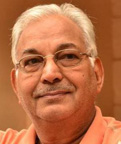To whatever religion you may belong to – Hinduism, Sikhism, Islam, Christianity or whatever; whatever faith and belief you may follow, basically three important concepts need to be pondered over. One, existence of the material world; two, existence of your own self; and three, existence of God.
Whether this material world is real or unreal, stable or unstable, permanent or temporary, has been a debatable subject. What we see with our naked eyes and continue to witness the objects for a long period of time, are taken for granted as real and longer lasting. With a passage of time, we develop attachment to those objects or people and inculcate a sense of belonging to them. By and large, individuals establish strong bonds of relationship and get deeply involved with the ego-centric desires. I, me and mine play an important role in their lives. More often than not, such relationships are termed as love and affection for each other. Cordial relations create an ambience of comfort and strained relations animosity. Love and affection, without reward have become meaningless. The intense desire to have something in return has reduced human beings to traders and sometimes beggars. What madness in this material world! In the ultimate analysis, our own observations and the holy scriptures indicate that the material world is subject to change, transitory and mutable; so are its inhabitants and as such is not real. What is not real has no permanent existence.
Like the material world, all living organism and the objects that we see are subject to change, decay and reconstruction. Change is the very essence of life. But one existence, that keeps watching these changes, as a spectator, is jeevatman, which is unchangeable, imperishable and ever lasting, thus is real and a permanent entity. Lord Krishna tells Arjuna in Bhagwad Gita, “There was never a time when I did not exist, or when you or these kings did not exist. Nor it is a fact that hereafter we shall cease to exist…The unreal has no existence and the real never ceases to be; the reality of both has thus been perceived by the seers of truth. Know that to be imperishable, by which all this is pervaded; for none can bring about the destruction of this indestructible substance”. The material world is, therefore, subject to change, transitory and perishable, whereas the soul (jeevatman) is indestructible, permanent and eternal. Hence no permanent relationship can exist between the destructible and the indestructible, unless you perceive God in every soul and object that you come across.
The relationship between Parmatman and Jeevatman was established right since the inception of this universe – jeevatman being part of Pramatman. Both are inseparable part of each other. God, the omnipresent, omnipotent, omniscient existed before the creation of this universe, has been existing and will continue to exist even after the end of this perishable material world. Pram Pujya Guru Nanak Devji describes the Supreme Power as “Aad sach, jugaad sach, hai vi sach, Nanak hosi vi sach”. Every single speck of this universe comes within the domain of God – Vasudeva Sarvam. Therefore, a firm belief about the existence of God and our Jeevatman being part of Him, carries conviction that He belongs to us and we belong to Him.
Like our creator, our real nature is sat-chit-ananda. However, because of our involvement with the sense objects, we develop attachment to the material world and keep revolving around our ego-centric desires. And we do it so intimately and confidently that we take it for granted that I, me, mine and the material world are the ultimate achievements and we keep living in that myth. But the moment curtains of such attachments are lifted and wisdom dawns upon us that only one relationship is permanent and that is between Jeevatman and Paramatman, we enjoy the experience of liberation. The moment we realize that God belongs to us and we belong to God and this relationship is permanent, then the fountain of pure love springs up and we enter into the realm of eternal bliss. Whereas, with worldly objects or human beings, love and affection can at the most be termed as attachment which is conditional with rewards, but with God it is pure, total, unconditional, sublime and eternal love.
LOVE IS GOD AND GOD IS LOVE.


it gives an insight in the teaching of all the religions.The practical and spiritual aspect of our life. INDEBITED to Trehen guruji for giving us the true picture of life and “post-life”